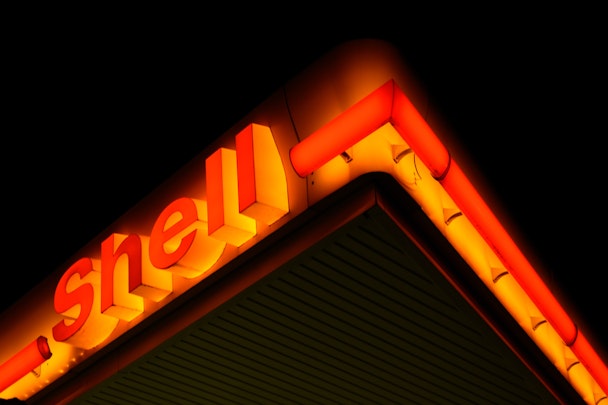It’s time to remove our climate disaster gags and recognize the power of ads
Jake Dubbins, chief executive officer of integrated ethical agency Media Bounty and co-chair of the Conscious Advertiser Network (CAN), looks at big oil’s attempts to decelerate desperately-needed climate adaptations and explores the role creatives are playing in laying the groundwork for global disaster.

A contract obtained by Channel 4 between oil and gas giant Shell and the Science Museum included a ‘gagging’ clause
We live in an age of hypocrisy. We are all complicit.
I am a vocal critic of the glacial pace of change ahead of the climate emergency. Policy, industry initiatives and individual action are all not enough.
Yet during lockdown we, like many others, bought a puppy. A luxury purchase and one that not only eats meat, but often ignores the bowls we put in front of her. Humans are growing crops to feed to animals that are then slaughtered to feed other animals that would not exist without the selfish whims of humans. I am a total hypocrite.
And the advertising industry is rife with it.
We give out award after award for effectiveness. But when challenged on the burgeoning obesity crisis, we say that our work only makes a Smartie-sized difference. So ads for Smarties sell only one more Smartie? That is a pretty bad return on investment – or simply not true. Why do advertisers spend millions on advertising, sponsorship and endorsements? Because it sells more burgers, soda and sweets. I can’t wait for the industry to say that fossil fuel advertising only accounts for a gram of CO2 per year.
We talk a lot about diversity and taking steps to ensure that women feel genuinely included in this male-dominated industry. Yet big companies also demand that employees sign NDAs to ensure that powerful men who sexually abuse women are protected. These NDAs seem to override the actual law. We want to include women, but only if you sign this contract saying that if you have been a victim of abuse you need to shut up.
Another type of NDA or ‘gagging order’ was in the spotlight last week. A contract obtained by Channel 4 between oil and gas giant Shell and the Science Museum included a clause saying the museum would not “make any statement or issue any publicity or otherwise be involved in any conduct or matter that may reasonably be foreseen as discrediting or damaging the goodwill or reputation of the sponsor”.
The scientific consensus on climate change is overwhelming in its conclusions that human activities are estimated to have caused approximately 1C of global warming above pre-industrial levels, with a likely range of 0.8C to 1.2C. So far. The cause, according to the IPCC, is ‘anthropogenic emissions’. To you and me, that’s the emissions from the petrol we use in our cars, the fossil fuels we burn to heat and light our homes and the fuel we use to fly on business trips or on our summer holidays.
There is a myriad of recommendations coming from every corner on the package of changes that we need to adopt in order to keep temperature rise to between 1.5C and 2C as per the Paris Climate Agreement. The IPCC is likely to report in the next couple of weeks that this target is becoming vanishingly difficult. There are three main areas governments are looking to legislate in to hit emission reduction targets – banning petrol and diesel in transport in favor of electric, decarbonizing the way we heat and light our homes and cutting down on meat and dairy in our diets.
In that mix of measures, you will not see ‘carbon capture’. That is because it does not work anywhere near the scale that we need to see to halt emissions. In what Ian Porter, a former oil and gas industry executive, called a “shocking failure of one of the world’s largest engineering projects”, Chevron, in partnership with Shell and Exxon Mobil, revealed earlier this month that it had only managed to deliver 30% of its five-year target.
You can probably guess what the exhibition sponsored by Shell at the Science Museum was. Carbon capture.
The clue is in the name with the Science Museum. You think you know what you are getting. Science. Unless that science is particularly inconvenient to one of the world’s biggest fossil fuel companies. It is a pretty awkward position to be in to accept a great deal of money to stage an exhibition on the science of carbon capture, to then know that the science has failed and, due to a gagging order, you cannot say anything about the fact that the science has failed in case you damage the goodwill or reputation of Shell. Maybe the Science Museum needs an agency to launch a rebrand as the Corporate Lobbying Museum?
Let’s call it what it is. Hypocrisy.
I am going to ask my wife to sign a contract to ensure that she will not talk in public about our dog ownership to protect my reputation as a proponent of ethical marketing.
If we are to rebuild trust in what we do as an industry, then we need to start owning our own hypocrisy. We can start in three powerful ways:
1. Accept that we are all hypocrites in the fight against climate change and work to overcome our own double standards.
2. Recognize the power, influence and – yes – effectiveness of the advertising industry even in markets such as HFSS and high-carbon industries including fossil fuels.
3. Start using that power to support the science on climate through our work.
Our lives, reputation and – most importantly – pets depend on it.
